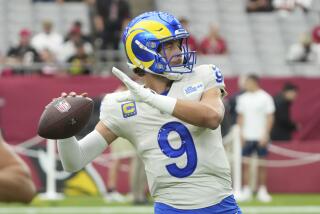49ers Found Guilty of Fraud in Krueger Case : Team Didn’t Tell Lineman Severity of Knee Injury That Left Him Crippled
- Share via
SAN FRANCISCO — The San Francisco 49ers were found liable for fraud by a state court Friday for failing to tell defensive lineman Charlie Krueger the severity of a knee injury that has left him permanently crippled.
A unanimous three-judge panel of the 1st District Court of Appeal ruled that the National Football League team never told Krueger of the risk he was running when he played in severe pain for the last 10 years of his career, from 1964 to 1973, despite regular pain-killing drug injections by team doctors.
“In its desire to keep (Krueger) on the playing field, (the 49ers) consciously failed to make full, meaningful disclosure to him respecting the magnitude of the risk he took in continuing to play a violent contact sport with a profoundly damaged left knee,” said the opinion by Justice William Newsom.
He said Krueger suffers from traumatic arthritis and an irreversible, degenerative process in his knee. He cannot stand up for prolonged periods or run, and suffers severe pain when he walks on stairs, Newsom said.
The court ordered the case returned to a San Francisco Superior Court to determine the amount of damages the 49ers must pay.
Lawyers for the team and Krueger could not be reached for comment. The ruling could be appealed to the state Supreme Court.
Krueger, a mainstay of the 49er line from 1958 to 1973, ruptured a ligament in his left knee in 1963 and underwent surgery, which he was told left the knee in good repair, the court said.
However, a post-operation report indicated that a ligament was missing from his knee, information Krueger said he never learned. Instead, after experiencing pain and swelling in 1964, he was given a large number of steroid and Novocain injections--50 that year, and 14 to 20 a year through 1973--while bloody fluid was drained from the knee.
Krueger said he was never told of the dangers of steroid injections. The court said he was also told by a team doctor to use amphetamines during games.
Krueger said he felt a piece of his knee break off after being hit in a 1970 game but was given codeine and told to resume playing.
He played the rest of the season, then underwent another knee operation in 1971. He said he was never told that he risked permanent injury by playing without undergoing surgery; that X-rays taken between 1964 and 1971 showed degeneration in the knee, or that the results of the operation were consistent with known adverse reactions to steroid use.
Even after Krueger retired, a 1974 physical examination arranged by the team’s Dr. Lloyd Milburn did not include testing of his knees, and he did not learn of his crippling condition until after surgery in 1978, the court said. He filed suit in 1980.
Superior Court Judge Richard Figone ruled in the 49ers’ favor after a non-jury trial, saying Krueger would have continued playing even if he had been advised fully about his injuries. But the appeals court said the ruling was “mere conjecture” inconsistent with the evidence.
Krueger “demonstrated throughout his football career a courageous--some might say foolhardy--willingness to endure pain and injuries for the sake of his team and employer, but no credible evidence suggests that he ever assessed and accepted the prospect of permanent disability,” Newsom wrote.
“On the contrary, he testified that he would have retired had (the 49ers’) physicians recommended that course of action, and no contrary evidence was offered.”
More to Read
Go beyond the scoreboard
Get the latest on L.A.'s teams in the daily Sports Report newsletter.
You may occasionally receive promotional content from the Los Angeles Times.










